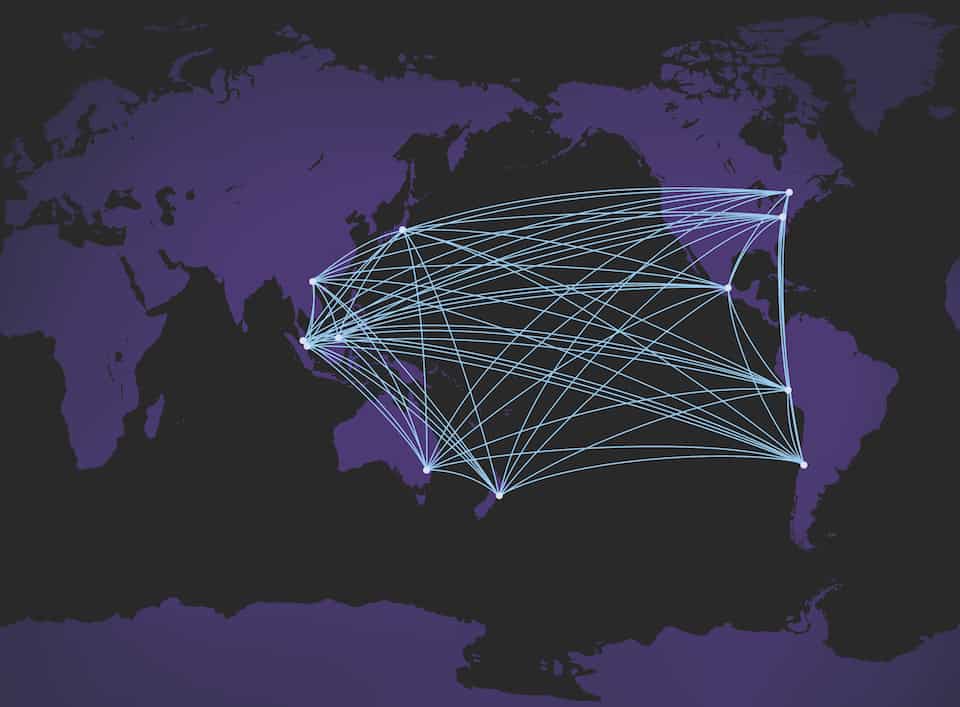[dropcap]The[/dropcap] term ‘free trade’ commonly alludes to an idealized picture of the world. Bustling and bountiful, everyone is a winner in the liberal marketplace: firms profit, states rake in the tax dollars, and citizens are cheerily employed. But the Trans Pacific Partnership (TPP), hailed by negotiators as the “trade deal of a generation,” provides a dark glimpse of the other side of the coin.
Often portrayed as a benevolent pledge towards mutual prosperity, the 5,000-plus-page agreement is poised to change the way Canada negotiates with foreign investors. Certainly, for these partners, the TPP is good for business. But if you don’t hold shares in Goldman Sachs, the emerging changes will hurt you. Indeed, journalist Chris Hedges flatly called the deal a means of “corporate enslavement,” and civil rights groups throughout the Pacific region echo his sentiment. Even Blackberry’s old co-CEO Jim Balsillie condemned the deal as the “worst thing in policy that Canada’s ever done,” albeit if only for monetary reasons.
Privatization looks to threaten public services like healthcare and education, environmental regulations will be effectively neutralized, prices for basic goods will surge, and low wages will proliferate. Under the deal, businesses involved in foreign markets gain legal protection, freeing them from the usual risks of direct investment in other countries. In theory, this should fuel the economy, adding jobs to the market and tax revenue to the common trough.
Alas, the caveat: if a member country changes its laws in such a way that impedes business as usual — say, by implementing environmental or labour regulations that dig into an investor’s anticipated revenue — that company has a ‘right’ to demand reimbursement. As a result, it becomes more lucrative for firms to invest and settle anywhere a profit can be turned, but it also poses a threat to national sovereignty, tying the hands of governments who are simply trying to keep their budgets in the black. This condition is aggravated by the fact that only corporations can sue. Essentially, it is thinly veiled extortion as reasonable, market-stimulating incentive.
When conflict occurs between legislation and corporate profit projection, the case goes before a tribunal. The adjudication process, called an investor-state dispute settlement (ISDS), occurs through private channels: corporations hire prosecutors to make their case in front of an ad hoc panel not beholden to any government. Furthermore, the TPP appears to leave the floor wide open for corporate lobbyists to beat a panel into submission, entitling third parties to attend hearings and interject as they please.
Ripe is the potential for abuse. ISDS cases have wreaked havoc on national economies since the first lawsuit in 1959. A Guardian feature last summer outlined some of these atrocities, noting a successful claim by the French corporation Vivendi after the Argentinian government attempted to limit the price the corporation charged for fresh water. Argentina, in the end, was forced to pay more than $100 million U.S. in restitution. In another case, a tribunal affiliated with the World Bank ordered Venezuela to pay $1.77 billion to Exxon Mobil after the government attempted to nationalize the oil industry. And perhaps most abhorrently, when Ecuador broke a contract with American oil company Occidental Petroleum, it was ordered to pay $1.8 billion to make up for the firm’s profit losses.
These examples, though shocking, are not exceptional — the UN cites 608 ISDS cases worldwide since 1987, listing a disconcerting number of settlements or rulings in favour of the investor. The outcomes are often so nasty that even The Economist took note when it commented on ISDS practices last fall, stating bleakly that though the methodology intended to “encourage foreign investment by protecting investors from discrimination or expropriation… the implementation of this laudable idea has been disastrous.”
Aside from granting corporations the right to challenge laws, the TPP also contains a clause permitting firms to have a say in creating legislation in the first place, as The Tyee reported last week. This privileges corporate agendas, causing a clear threat to anybody else trying to make change in the world. Environmental activists, labour and human rights advocates, journalists, academics, and researchers spring to mind as those most likely to be silenced or compromised. A government under financial intimidation is not incentivized to give these groups easy access to sensitive information, or to disclose data that might damage corporate profitmaking.
As the TPP stands to be ratified by Parliament in the coming weeks, there is a chance that the treaty’s more ominous components may be tempered. To the Liberal Party’s credit, international trade minister Chrystia Freeland has publicly stated her openness towards receiving comments from citizens and reviewing the text. Given that many students are her constituents as residents of University-Rosedale district, it is especially prudent for us to express our hesitation or distaste with the TPP.
But apart from rejecting the deal altogether, it looks as if legislative action is powerless to stop the TPP — no amount of amending will offset the powers granted to big business. As it stands, signing off on the deal means signing up for rule by the richest few.
Malone Mullin is a fifth-year student studying philosophy. Her column appears every three weeks.


